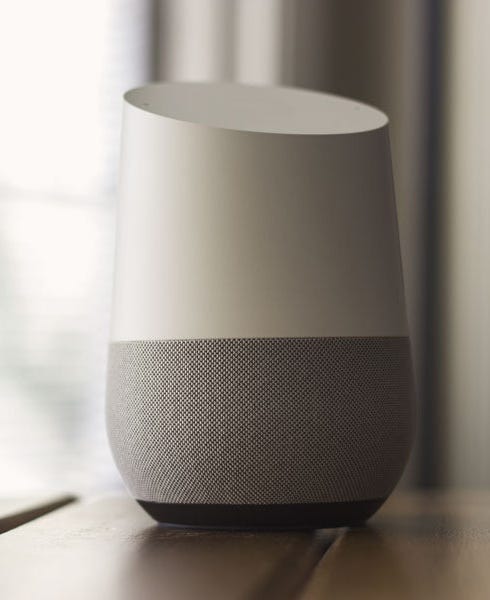Promise vs Reality
When Google acquired Nest in 2014 it was the biggest acquisition of an energy tech company. Nest had taken the lowly thermostat and made it desirable and sexy. It was the first smart home product that made utilities think ‘customers might actually care about this stuff!’. The Nest story also became a slide in every energytech company’s fundraising pitch deck; around this period I saw at least fifty pitch decks that had Nest as a model and Google as a possible acquirer. It seemed awesome!
But then it wasn’t.
There was the whole Fadell-is-a-tyrant debacle after the Dropcam acquisition. Then Nest failed to ship any new products for a few years after the acquisition. Then Tony Fadell quit. And now, Nest is coming back under the Google brand. Even as the co-founder of Nest, Matt Rogers, leaves the company. At an acquisition price of $3.2Bn and cost of capital of (say) ~10% Nest should generate ~$300M of additional EBITDA to make the deal breakeven. Alphabet’s revenues from its other bets generated $794M in 2017, mostly coming from Nest, Verily and Fiber. Even if Nest generated 1/3rd of that amount, it isn’t doing the multiples of growth that Google must have been hoping for when the Nest acquisition happened. So what went wrong?
So What Went Wrong?
A big sign of the problem with the Google acquisition of Nest was that Google/Alphabet kept releasing new connected products under its own brand name and let Nest run as a separate business. Google and, less so, Nest kept releasing compatible but non-complementary products for the smart home. This was two different companies going for it on their own. Amazon’s approach to the smart home suggests that a platform approach, with a centralized home hub, is more likely to be the winning strategy for the smart home. Amazon is owning the home with a convenience platform (Echo) and, say what you will about HomePod, Apple is experimenting with the entertainment use case for the smart home. But what is Google’s platform approach? It could have been comfort (the third of the three smart home use cases) with Nest. But that advantage is being lost because Google decided to be a ‘taker’ not a ‘giver’ in the Nest acquisition.

The Giver vs Taker Problem In M&A Deals
Google has never been a hardware company. While it will go down as one of the greatest software companies of our time (with a basic business model), the idea behind the Nest acquisition was to ‘take’ expertise from Nest. This almost never works in acquisitions. Most successful M&A deals, where the integration of the acquired company into the acquirer provides the expected benefits from the acquisition, are borne out of a situation where
- the strategic direction of the acquirer is in line with that of the acquired and there is cheap capital to enable the acquired company to grow. Considering the smart home aspirations of Google/Alphabet, Nest made sense. The blank check that Google made to its ‘other bets’ got taken away when the company became Alphabet and this is where the problems started…
- The acquirer is transferring internal relevant skills to the acquired company. On this measure, the Google’s acquisition of Nest was bound to fail. Google did a great job transferring its internal skills to Android after and made it the most popular OS for smartphones. But that was in software, an area we know Google has strategic advantages and expertise that few other companies (will ever) have. Unfortunately, hardware hasn’t been Google’s deal. So what will be different this time?
- The acquirer is looking to give more than it takes. This is where Google truly failed with the Nest deal. As suggested in this HBS article, Google giving to Nest, after the acquisition would have been doing the two things above while providing managerial oversight. This stopped being the case once Google decided to start releasing its own brand of smart home products and looked to Nest purely for the revenue value it could provide.
Sell Nest? Yes.
If estimates are to be believed, we will have a lot more connected devices in our lives than we need. Gartner suggests that we’ll have 75Bn connected devices and PWC suggests we’ll spend $236Bn by 2020. Google is trying to be a big part of that and there are two ways to do that
- Sell Nest to another company. Yes, I said it. A sensible approach could be to focus on building an open source operating system for smart/connected devices. Or buy a company that is focused on doing exactly that. It will be right along the lines of the Android acquisition/post-acquisition strategy. And it will take advantage of the deep expertise that Google already has, which has worked out relatively well, to address a market that the company desperately needs to find a way to compete in. For all the smaller companies that might have hardware chops, an open source platform that utilizes AI and Voice architecture from Google wouldn’t be such a bad proposition. And even if Google decides not to follow the open source approach, it could take the AWS approach to owning the underlying infrastructure.
- Truly subsume Nest. And not just bringing it under Google to save face or to recoup sunk costs. But actually, dedicate all the resources currently allocated to the ~12 hardware products to Nest and convert all current Google smart home products into Nest branded devices. This would be moving away from the strategy adopted in the $12.5Bn Motorola acquisition, which was a complete failure. One competitive advantage that Google/Alphabet has right now is that connected devices are becoming more about the underlying software than hardware, with Artificial Intelligence playing more of a role than ever before. And few do software like Google/its subsidiaries. Especially DeepMind. From my unscientific survey, not many people are replacing the Nests they already own, it’s not that Iphone-esque of a product. But, considering that there is still a huge market for hardware devices for low-income (in the US) and global consumers, staying in the game will be worth it.
I have little doubt Google/Alphabet will figure this out. They have the benefit of a growing market, not as much true competition out there and historic data/expertise that will inform a winning strategy. Key questions though; is Alphabet willing to accept that the ‘Ship and Iterate’ approach to software development, which it does well, is the reason it keeps messing up with hardware? And will the company be willing to change its paradigm to win on the hardware front?












